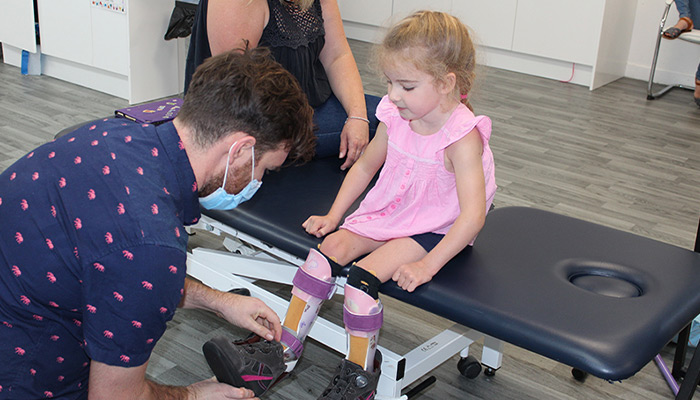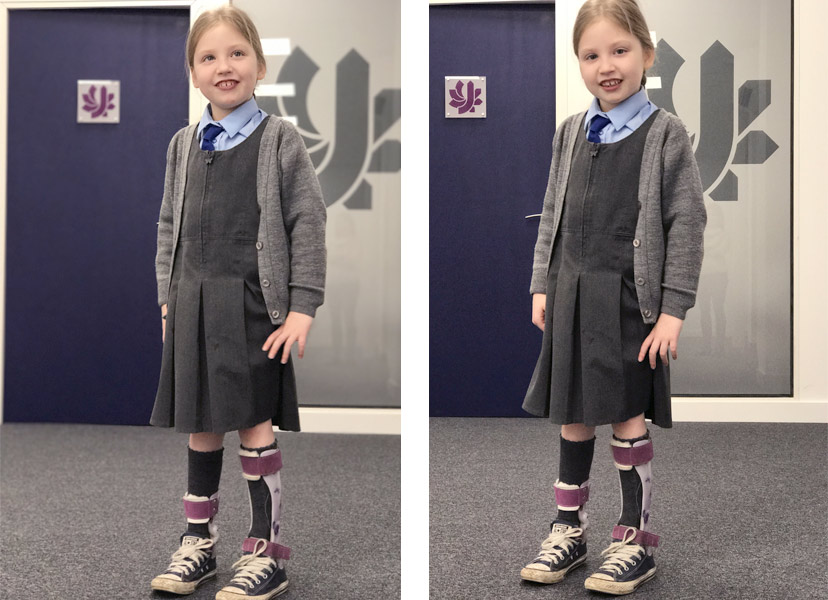
01 October 2021
October 6th is World Cerebral Palsy Day. This important event sees people living with cerebral palsy, their families, and the organisations that support them, come together as one movement to create awareness and action around the condition.
LOC is proud to be one of those organisations – working with hundreds of children and adults across the UK to help them build mobility and independence through orthotic treatment. We are delighted to add our voice to the millions taking part in World Cerebral Palsy Day by sharing our own expertise on how paediatric orthotics can help children and adults living with the condition.
17 million people worldwide have cerebral palsy, a complex condition caused by damage to the motor functions of the brain before, during or after birth. In fact, cerebral palsy is the most common physical disability in childhood. Whilst the symptoms vary from person to person, all people with cerebral palsy experience difficulties with movement, balance, and posture. Symptoms can range from mild to very severe, and many people also have related difficulties, including seizures, scoliosis, or issues with their vision, hearing and joints.
Find out more about cerebral palsy here
Whilst cerebral palsy is a lifelong condition, orthotics can play a huge part in improving a patient’s mobility, independence, and quality of life. In particular, lower limb orthotics including bespoke ankle foot orthotics (AFOs) offer patients the right support and stability to build mobility, balance and strength. Other orthotics include spinal braces, which help to maintain correct alignment in the spine, and lycra suits, which allow natural muscle movement whilst guiding weaker or abnormal movement by placing gentle pressure and direction on specific muscles.
Cerebral palsy is a lifelong condition, and orthotic treatment can help patients at any age. Get more guidance on adult cerebral palsy here.

LOC has built a reputation for our expertise in helping children with cerebral palsy recover after SDR (selective dorsal rhizotomy) surgery. This surgery aims to reduce stiffness and improve mobility by severing the nerves in the spine that are responsible for muscle rigidity.
SDR surgery can have dramatic results but, in our experience, rehabilitation is a vital part of the journey. The patient has to rebuild their muscle strength and relearn walking and movement patterns. Correctly designed and applied orthotics play a very important part in that process. LOC’s orthotic treatment is designed to strike the right balance between encouraging a child to work their own musculature to build strength, whilst supporting areas of weakness.
Crucial to this approach is our OSKAR (Optimal Kinematic Alignment approach to Rehabilitation) clinic, developed by world renowned physiotherapist, Elaine Owen MBE MSc SRP MCSP. OSKAR has been specifically designed to treat the symptoms of lower limb neurological conditions including cerebral palsy and spina bifida. OSKAR aligns with ICF (International Classification of Functioning, Disability and Health) guidelines, and has built an extensive evidence base over the past 6 years.
OSKAR provides a framework within which our orthotists assess and measure a patient’s physical functioning, gait and walking patterns. This happens in our on-site video-vector gait laboratory, where we can measure exactly where force is positioned in relation to the leg. This is essential in fine-tuning lower limb orthotics to achieve the optimal outcome for each patient.
This is the starting point to build a bespoke package of treatment that sets realistic goals for each child, based on their individual needs and presentation. The aim is to work holistically with parents and other healthcare professionals to treat, review and measure progress against those goals so that everyone involved can understand the progress that is being made and where support is best targeted.
There are a number of charities and support groups out there for cerebral palsy patients and their families. These include The Brain Charity and SCOPE.
LOC also work in partnership with the charities Tree of Hope and Just4Children. They can assist with fundraising to meet the costs of treating and supporting children with cerebral palsy.
To find out more about how the London Orthotic Consultancy can help with the symptoms of cerebral palsy, visit our cerebral palsy page, or contact LOC directly to arrange a consultation with one of our orthotists.
We have the following facilities and amenities at our Kingston Upon Thames location:
We also have the Gait Laboratory for orthotics patients and Onsite Manufacturing for speedy turnarounds and adjustments whilst you wait.
We have the following facilities and amenities at our Cambridge location:
We have the following facilities and amenities at our Bristol location:
For more information, visit Litfield House Medical Centre.
LOC’s clinic is based in the University of Salford’s Podiatry Department and provides treatments for orthotics, scoliosis, pectus deformities, positional plagiocephaly and club foot.
It is also the base for LOC’s northern OSKAR clinic which is run by Sam Walmsley, clinical director of LOC, in conjunction with Elaine Owen MBE MSc SRP MCSP.
Due to COVID-19, we have had to temporarily close the Salford clinic and are operating out of another clinic in Bolton.
508 Blackburn Rd,
Astley Bridge,
Bolton
BL1 8NW
For more information, please visit The Good Health Centre
If you are a concerned parent with a child who is experiencing movement difficulties due to a condition such as cerebral palsy, spina bifida or acquired brain injury, we can help. Take a look at our paediatric orthotics pages to get started, or contact LOC directly.